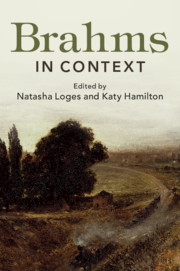Book contents
- Brahms in Context
- Brahms in Context
- Copyright page
- Dedication
- Contents
- Illustrations
- Music Examples
- Notes on Contributors
- Preface
- Abbreviations
- Part I Personality, People and Places
- Part II Identities, Environments and Influences
- Part III Performance and Publishing
- Part IV Society and Culture
- Chapter 26 Politics and Religion
- Chapter 27 Literature
- Chapter 28 Philosophy
- Chapter 29 Visual Arts
- Chapter 30 Science and Technology
- Part V Reception and Legacy
- Further Reading
- Index
- References
Chapter 30 - Science and Technology
from Part IV - Society and Culture
Published online by Cambridge University Press: 15 May 2019
- Brahms in Context
- Brahms in Context
- Copyright page
- Dedication
- Contents
- Illustrations
- Music Examples
- Notes on Contributors
- Preface
- Abbreviations
- Part I Personality, People and Places
- Part II Identities, Environments and Influences
- Part III Performance and Publishing
- Part IV Society and Culture
- Chapter 26 Politics and Religion
- Chapter 27 Literature
- Chapter 28 Philosophy
- Chapter 29 Visual Arts
- Chapter 30 Science and Technology
- Part V Reception and Legacy
- Further Reading
- Index
- References
Summary
Brahms witnessed a period of staggering scientific and technological advances throughout Europe and the burgeoning USA. The nineteenth century offered new modes of transportation: musicians could now travel to distant cities to perform. With this mobility came the need for standardisation, both of technological devices as well as musical parameters, such as concert pitch, which varied considerably among cities. Brahms was both interested in, and delighted by, advances which related to music and its performance, from train travel to new research in the natural sciences. Indeed, he became an interlocutor with a number of leading natural scientists of the period.
By the 1830s, the Industrial Revolution was in full swing in Britain, and German cities were slowly experiencing the effects of mechanisation. A crucial development in both production and communications was the steam engine, which powered factory machinery, facilitating mass production.
- Type
- Chapter
- Information
- Brahms in Context , pp. 296 - 304Publisher: Cambridge University PressPrint publication year: 2019

